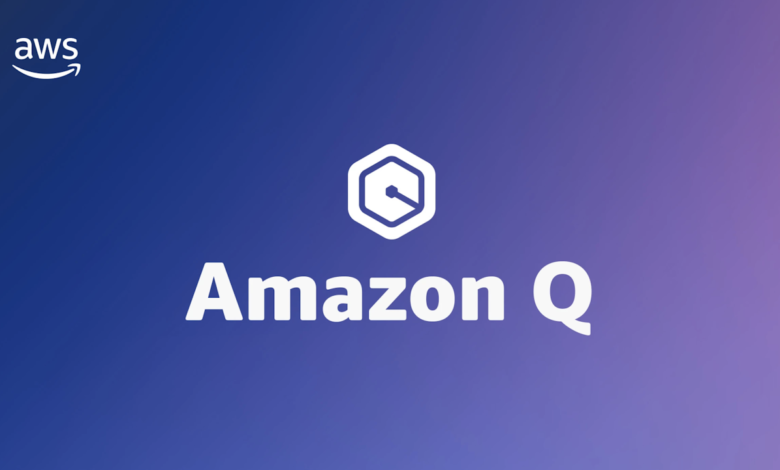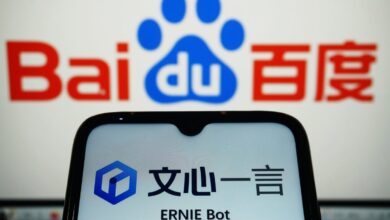With release of Q chatbot, Amazon’s enterprise AI strategy appears to mirror Microsoft’s

The tech giant has been selling its AI chatbot as an automated assistant that can help businesses develop software and field employee questions.
Amazon announced this morning that Q, its generative AI-powered chatbot designed to help organizations manage and leverage internal data, is now available for all Amazon Web Services (AWS) customers.
Initially unveiled in November in a limited preview, Amazon Q has been positioned by the brand as an AI assistant that can help AWS customers build software, debug code, answer employee questions related to internal operations and handle rote technical and administrative tasks.
The name is a play on two fictional characters of the same name; one from Ian Flemings’ 007 series, a nerdy but brilliant and charming inventor who’s constantly equipping James Bond with new gadgets, and another from Star Trek. It’s also meant to suggest the word “question,” a nod to the chatbot’s ability to answer queries.
“Amazon Q is the most capable generative AI-powered assistant available today with industry-leading accuracy, advanced agents capabilities, and best-in-class security that helps developers become more productive and helps business users to accelerate decision making,” Dr. Swami Sivasubramanian, vice president of AI and Data at AWS, said in a statement published today.
“Early indications signal Amazon Q could help our customers’ employees become more than 80% more productive at their jobs; and with the new features we’re planning on introducing in the future, we think this will only continue to grow,” he added.
While Q’s mandate might not be as attention-grabbing as, say, Sora, a recently unveiled (but not yet publicly accessible) AI model from OpenAI that creates high-resolution video imagery, it nonetheless marked a significant step for Amazon in its efforts to secure a competitive edge in the escalating race among big tech companies to build and commercialize generative AI.
Amazon “is making a big step in its efforts to solidify its status as a pioneer in creating and making AI technologies widely available,” says Brian Prince, founder and CEO of TopAITools.com, an online education resource focused on the AI industry. “Not only is [the company] able to leverage its AWS cloud infrastructure with this release – it also allows them to appeal to a broader audience of business clients.”
The starting gun for the generative AI race went off in November 2022, when OpenAI surprised the world with the launch of ChatGPT (one year to the day, incidentally, before Amazon introduced Q). Other tech titans like Google, Amazon and Meta soon began investing significant talent and resources into their own efforts to build AI.
“There’s a general vision that these [AI] chat agents are absolutely going to be ubiquitous,” Daniel Faggella, TK. “And that really is the truth – that is where the future is heading.”
According to Faggella, Amazon’s strategy for Q closely mirrors Microsoft’s approach with the deployment of Copilot, an AI assistant that was embedded into the company’s Office 365 suite for all clients in November. Just as Microsoft offers GitHub Copilot for software developers as well as a more general-purpose enterprise version of Copilot, Amazon has made Q available in two formats: Developer and Business. A third format, Apps, which according to Amazon, enables employees to build their own AI-powered apps using their company’s data, was also released today in a limited preview.
In Faggella’s view, Amazon seems to some degree to be following in Microsoft’s footsteps. “This feels like more of a reach for Amazon than it does for Microsoft … [and] a little bit like an also-ran,” Faggella says. “It also seems like it’s a world that [Amazon] can’t not be a part of, because so much of today’s work is going to be augmented and automated by artificial intelligence.”
Amazon upped its ante in the generative AI race in September when it began a series of investments – eventually totaling $4bn – in Anthropic, a startup founded by former OpenAI employees. Anthropic has since become a leading presence in the AI industry; early last month it launched Claude 3 Opus, a model with capabilities that reportedly exceed those of OpenAI’s GPT-4 along some important metrics.
In-house, meanwhile, Amazon has set out to build AI catered specifically to businesses. A little over a year ago, the company unveiled Bedrock, a platform designed to help AWS customers build their own apps using generative AI.
Though Amazon is “a little bit behind where Microsoft is in terms of their current positioning,” according to Faggella, it’s too soon to determine which brand will ultimately come out on top. “These things are going to be improving so rapidly it’s going to make people’s heads spin.”
For more on the latest happenings in AI, web3 and other cutting-edge technologies, sign up for The Emerging Tech Briefing newsletter.



